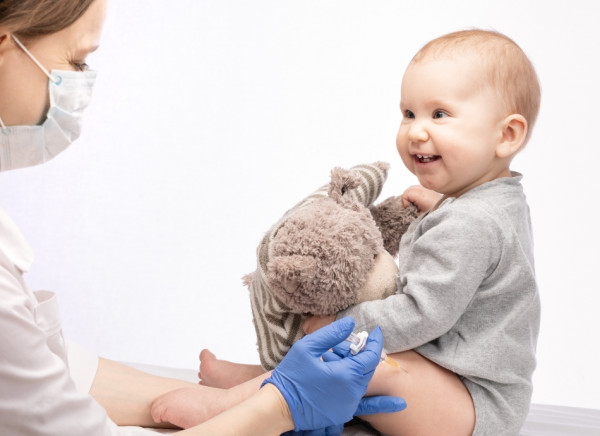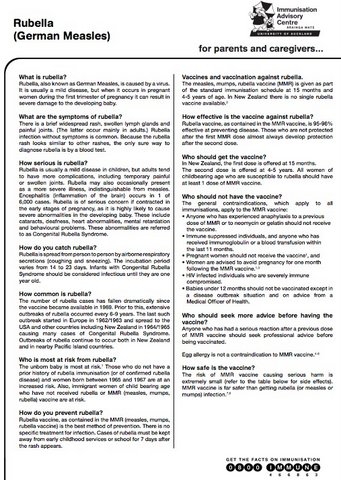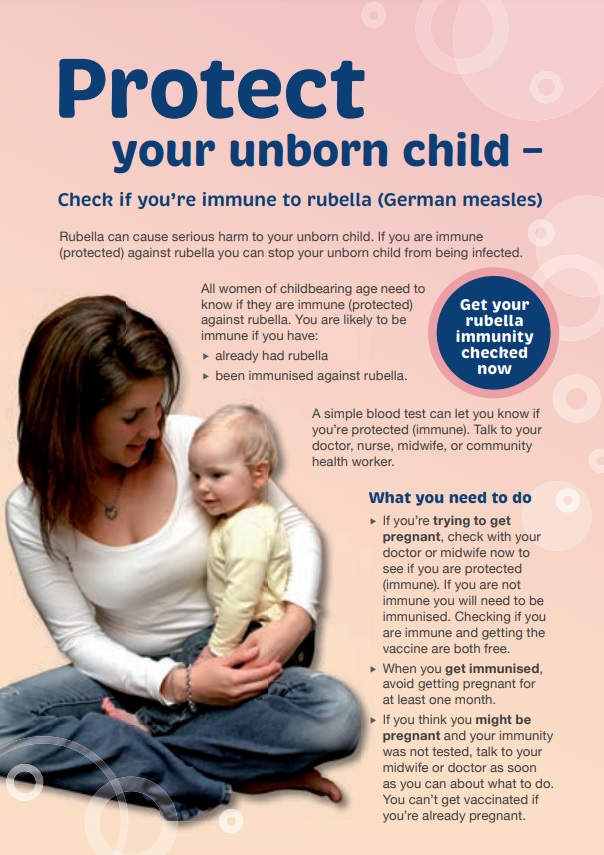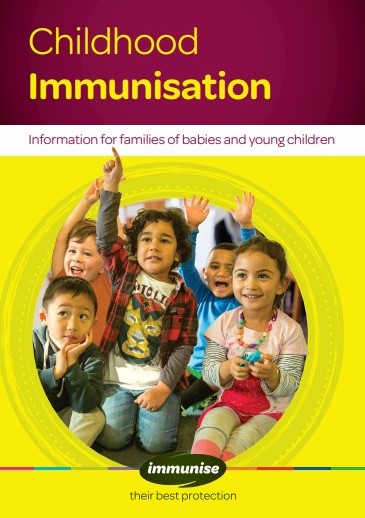If you're a frequent visitor to Healthify, why not share our site with a friend? Don't forget you can also browse Healthify without using your phone data.
Rubella
Commonly known as German measles or 3-day measles
Key points about rubella (German measles)
- Rubella is a viral illness that commonly causes fever and a skin rash.
- It’s usually a mild disease and it mostly affects school-age children.
- However, if you get rubella during pregnancy, it can have severe harmful effects on your unborn baby. It can also lead to miscarriage. If you’re planning pregnancy check you’ve been vaccinated against rubella.
- Anyone with rubella should avoid public places until they’re well or until 7 days after the rash appears.
- Vaccination is the best way to protect yourself and your tamariki. The vaccine is called the MMR vaccine (measles, mumps and rubella) and it’s usually given to children at 12 and 15 months.

Rubella is a viral infection that commonly causes a mild fever and a skin rash. It mostly affects school-age children.
It’s also called German measles, but it’s a different disease to measles(external link) (which is also called English measles).
Rubella is spread through having direct contact with someone who has it. It's also spread through the air when someone swallows or breathes in the cough or sneeze droplets from a person with the infection.
If a pregnant woman gets rubella, her baby is at risk of severe and permanent birth defects, such as deafness, blindness, heart defects and brain damage, or death.
Vaccination with measles, mumps and rubella (MMR) vaccine is the best way to protect against rubella.
If you're pregnant you shouldn't have the MMR vaccine. If you’re planning a pregnancy, ask your midwife or doctor if you need to be vaccinated against rubella so that your baby is protected. When you’ve been vaccinated, you should avoid getting pregnant for at least a month afterwards.
Rubella is caused by the rubella virus, which is spread:
- by having direct contact with somebody with rubella
- through the air when someone swallows or breathes the cough or sneeze droplets from an infected person.
If you become infected, you are most contagious when the rash is erupting. However, you could still spread the disease from 7 days before the rash appears to 7 days afterwards.
| If you or your child have rubella, you should avoid childcare facilities, school, work or other public places until you’re well or for 7 days after the rash appears. |
|---|
Unborn babies who get rubella from their mother during pregnancy can be infectious (able to spread the virus) until they’re 1 year of age.
The main symptom of rubella is a red or pink spotty rash. You’re infectious (able to spread rubella) between 7 days before and 7 days after the start of the rash.
The rash takes 2 to 3 weeks to appear. It usually starts behind your ears and spreads to your head, neck and body. The rash can be hard to see on dark skin, but might feel rough or bumpy. It lasts up to 5 days (the average is 3 days). It may or may not be itchy. See examples of rubella rash below.

Image credit: DermNet NZ(external link)
Rubella can also cause other symptoms such as:
- fever (a temperature of 38ºC or above)
- swollen lymph glands behind your ears and at the back of your neck
- cough
- sneezing and a runny nose
- headaches
- sore throat
- sore, red eyes
- aching or swollen fingers, wrists or knees (more common in adults).
Up to half of the people who get rubella will have no symptoms at all. But even if you don't have any symptoms, you can still spread the infection.
If you get rubella when you’re pregnant, especially during the first 3 months of pregnancy, the infection can be passed on to your unborn baby. This can cause severe abnormalities, known as congenital rubella syndrome, which may include cataracts (when the lens of the eye becomes cloudy), deafness, heart abnormalities, intellectual disability and behavioural problems. In some cases, miscarriage will occur.
- If you’re pregnant, you should have a blood test in early pregnancy to check whether you’re protected (immune) against rubella. This is part of the antenatal blood tests that are done during pregnancy. Even if the blood test from a previous pregnancy showed that you’re immune to rubella, the test has to be repeated at each pregnancy.
- If you think you might be pregnant and your immunity hasn’t been tested, check with your healthcare provider.
Pregnant women shouldn’t receive the MMR vaccine during pregnancy, even if blood tests show they're not protected (immune). They should receive the MMR vaccine after delivery.
| If you're pregnant and think you’ve been exposed to rubella, see your healthcare provider immediately. |
|---|
Planning a pregnancy
If you’re planning a pregnancy, it's best to make sure you have immunity to rubella before you become pregnant. Check with your healthcare provider whether you need to be vaccinated against rubella before you get pregnant. When you’ve been vaccinated, avoid getting pregnant for a month after your last MMR vaccination. Read more about the MMR vaccine.
Rubella is now uncommon in Aotearoa New Zealand, thanks to effective immunisation. However cases do still occur and anyone who hasn’t been vaccinated against rubella is at risk. The following groups are most at risk of rubella infection:
- Unborn pēpi (babies).
- People who have not had rubella, or have not been immunised for rubella.
- People born in Aotearoa New Zealand between 1965 and 1967.
The risks of getting rubella are often described as being greater for people who are able to bear children. This is because of the chance of unborn babies getting congenital rubella syndrome. However, during the last outbreak of rubella in Aotearoa New Zealand in 1995 to 1996, the main group affected were young men who wouldn't have been immunised. It's therefore important that all young people are immunised to reduce the risk of spread to people who are pregnant.
People travelling outside New Zealand to countries where rubella is still common (or where an outbreak is occurring) are at higher risk of infection and should make sure they're fully vaccinated against rubella before their trip.
Diagnosis
Your healthcare provider can usually diagnose rubella in children by asking about their symptoms and doing a physical examination.
It's harder to diagnose in adults, because:
- the symptoms might be absent or very mild
- symptoms may not be present for very long
- other viruses can also look like rubella.
The only way to confirm the infection is with tests such as a blood test or a throat swab. This is especially important in women of childbearing age.
Treatment
There are no specific treatments for rubella and the symptoms usually go away after a few days. There are things you can do to ease symptoms, such as:
- using pain relief, eg, paracetamol, to reduce pain and discomfort
- drinking enough fluids to stay well-hydrated and prevent dehydration.
Vaccination with the MMR vaccine is the best way to protect against rubella and prevent its spread. The fact that so many people with rubella have no symptoms makes it difficult to know who has had it and who hasn't. This makes it even more important to:
- check for immunity to rubella before becoming pregnant
- screen for rubella during early pregnancy with a blood test
- immunise the population.
This is important to prevent congenital rubella syndrome in babies. Read more about the risks of having rubella if you're pregnant above.
In Aotearoa New Zealand, the MMR vaccine is part of the free childhood immunisation schedule and is given at 12 and 15 months. See the immunisation schedule(external link) for more information.

Image credit: Canva
The vaccine may also be free if you haven’t previously been vaccinated or if you don’t know whether you’ve had the vaccine. The MMR vaccine is free for:
- everyone 18 years of age and under (it doesn’t matter what your visa or citizenship status is)
- people who qualify for free healthcare in Aotearoa New Zealand.
If you weren’t vaccinated in childhood you can still receive the vaccine – you need to have 2 doses at least 4 weeks apart. This provides long-term protection against rubella for most people.
Vaccinating boys
While rubella is especially risky for pregnant women, boys should also be vaccinated. This is because the speed at which rubella can spread in the community depends on the number of people who are not immunised. The infection won't spread if enough people are immunised. This is called herd immunity.
Read more about the MMR vaccine.
The best way to protect against rubella and prevent its spread is to make sure you and your children are vaccinated with the MMR vaccine. Read more about why vaccination is important above.
Anyone with rubella should stay at home for at least a week after the rash develops so they don’t spread the disease. It’s especially important to avoid contact with anyone who may be in the early stages of pregnancy.
Rubella is a notifiable disease. This means that if you have rubella, your doctor will let the National Public Health Service know so that they can try to find where the infection came from and reduce the risk of outbreaks.
Rubella(external link) Immunisation Advisory Centre, NZ
Diseases we immunise against(external link) Royal NZ Plunket Society
Rubella(external link) DermNet NZ
Rubella(external link) Health New Zealand | Te Whatu Ora
Brochures
Rubella (German measles)(external link) Immunisation Advisory Centre, NZ
Childhood immunisation booklet(external link) HealthEd, NZ
Protect your unborn child – rubella(external link) HealthEd, NZ
Infectious diseases(external link) HealthEd, NZ
References
- Rubella(external link) Immunisation Handbook, Health New Zealand | Te Whatu Ora, NZ
- Rubella(external link) Immunisation Advisory Centre, NZ
- Rubella(external link) DermNet NZ, 2016
- Measles, mumps and rubella (MMR) vaccine(external link) Health New Zealand | Te Whatu Ora, NZ, 2024
Brochures

Immunisation Advisory Centre, NZ, 2017

HealthEd, NZ, 2020

HealthEd, NZ, 2023
Credits: Healthify editorial team. Healthify is brought to you by Health Navigator Charitable Trust.
Reviewed by: Julia Fu, Public Health Registrar; Connie Alarcon, House Officer, Public Health Waikato
Last reviewed:





